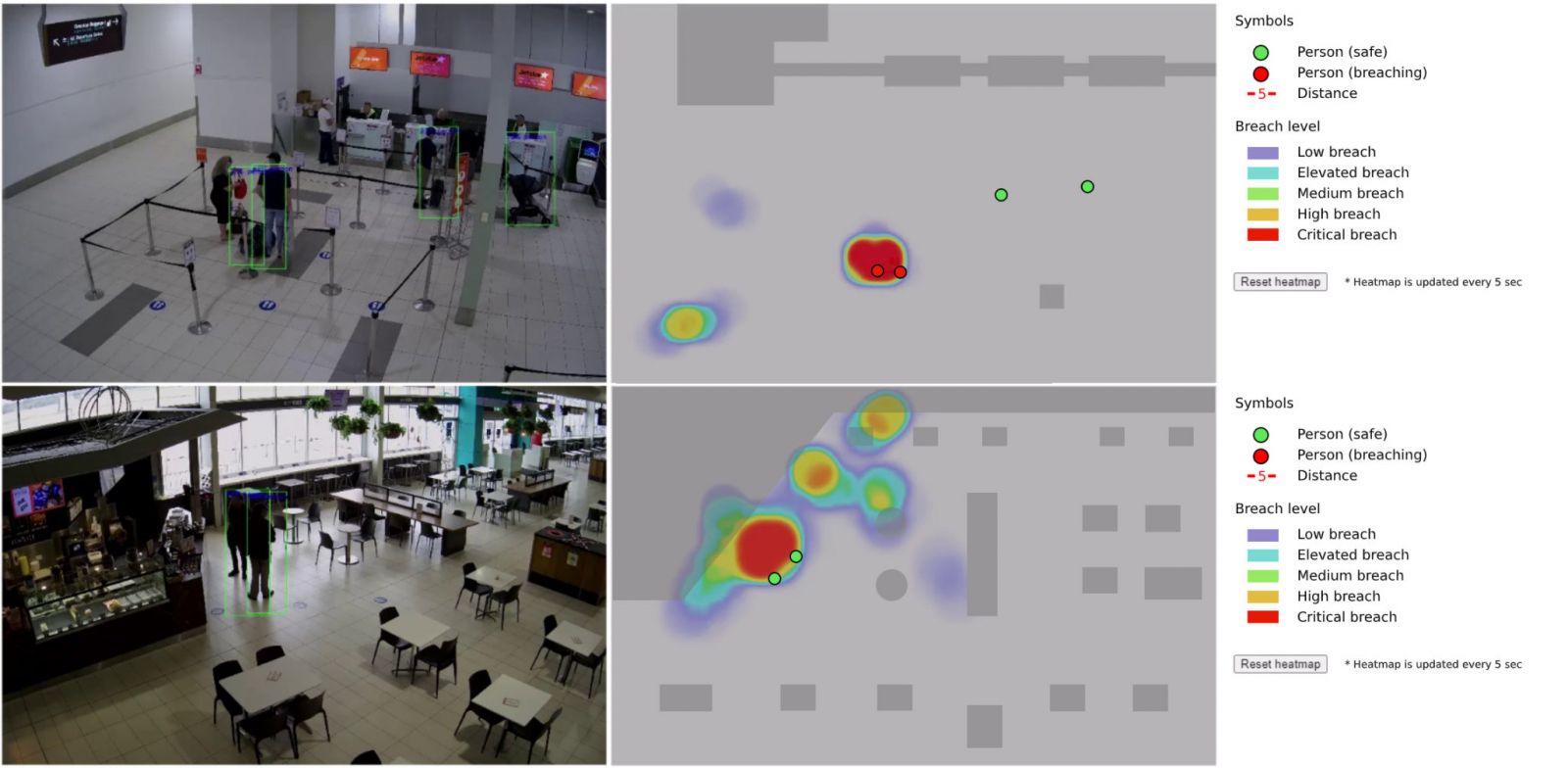Casella Launches Social Distancing Smart Tags for Workers
A smart-monitoring technology company has launched a wearable smart tag designed to make social distancing easier. The body-worn Orbi-Trace smart tag gives the...
Read Full ArticleResearchers at Griffith University, Australia, have developed an AI video surveillance system to detect social distancing breaches in an airport without compromising privacy.
By keeping image processing gated to a local network of cameras, the team bypassed the traditional need to store sensitive data on a central system.
The system has been piloted at an airport, to monitor social distancing breaches in large amounts of people.

Picture: a photograph of AI detection in action monitoring the check-in and departure area cafe, showing a heat map of cumulative breaches. Image Credit: Griffith Business School
Professor Dian Tjondronegoro from Griffith Business School says data privacy is one of the biggest concerns with this technology because the system has to constantly observe people’s activities to be effective.
“With our system, the central machine only needs to periodically call on local nodes to send updates they’ve made to their decision-making models without needing to see the images they’ve captured.
“These adjustments are added to the central decision-making model to improve accuracy.”
Published in Information, Technology & People, the case study was completed at an airport which, pre-COVID-19 had 6.5 million passengers annually with 17,000 passengers on-site daily. Hundreds of cameras cover 290,000 square metres with hundreds of shops and more than 40 check-in points.
Researchers tested several cutting-edge algorithms, lightweight enough for local computation, across nine cameras in three related case studies testing automatic people detection, automatic crowd counting and social distance breach detection to find the best balance of performance without sacrificing accuracy and reliability.
“Our goal was to create a system capable of real-time analysis with the ability to detect and automatically notify airport staff of social distancing breaches,” Professor Tjondronegoro said.
Three cameras were used for the automatic social distance breach detection testing covering the check-in area, food court and waiting area. Two people were employed to compare live video feeds and the AI analysis results to determine if people marked as red were in breach.
Researchers found camera angles affect the ability of AI to detect and track people’s movements in a public area and recommend angling cameras between 45 to 60 degrees.
Professor Tjondronegoro said their AI-enabled system design was flexible enough to allow humans to double-check results reducing data bias and improving transparency in how the system works:
“The system can scale up in the future by adding new cameras and be adjusted for other purposes. Our study shows responsible AI design can and should be useful for future developments of this application of technology.
“Our AI system performed in real-time giving accurate and reliable results. It can also generate heat maps to show cumulative breaches highlighting spaces which may need to be re-designed for public safety.”
Picture: a photograph of some social distancing signage
Article written by Ella Tansley | Published 24 August 2021
A smart-monitoring technology company has launched a wearable smart tag designed to make social distancing easier. The body-worn Orbi-Trace smart tag gives the...
Read Full ArticleRome Fiumicino Airport is the first airport in the world to be certified with the COVID-19 Five-Star Airport Rating, by international air transport rating agency...
Read Full ArticleBoris’ new rule of six doesn’t apply to workplaces, but how might the tightening of lockdown measures affect general confidence when returning to...
Read Full ArticleAdapting workplaces to increase employee confidence could cost larger property owners several million pounds, according to a report by the Financial Times. Liviu...
Read Full ArticleUsing two animations, the Construction Industry Coronavirus Forum is calling on staff to persist in safeguarding colleagues by following physical distancing...
Read Full ArticleThe construction phase of Australia’s first major airport in 50 years is complete. Billed as “a seamless and stress-free airport experience unlike any...
Read Full ArticleA new memorial in Aldgate that commemorates transport workers who passed away due to COVID-19 has been officially opened by the Mayor of London Sadiq...
Read Full ArticleMPs are recommending a series of measures to prepare the UK for future public health emergencies, resulting from an inquiry into the role of cleaning during the COVID-19...
Read Full ArticleA tech start-up that provides room-by-room energy management solutions for commercial buildings has raised close to £1 million in its second seed funding...
Read Full ArticleApril Harvey from Sodexo has been recognised for her role as health, safety and risk lead in the mobilisation of the first COVID quarantine facility and COVID-19 test...
Read Full Article